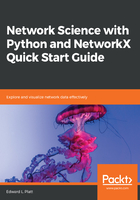
Network science today
With its interdisciplinary nature, network science draws practitioners from a wide variety of backgrounds. At the time of writing this book, only a handful of universities offer programs dedicated to network science, so network scientists tend to be self-taught, or trained as sociologists, physicists, ecologists, and so on. My own path to network science was similarly convoluted. Once an aspiring physicist, I came to realize I cared more about people than atoms, and left grad school to work on technology for civic organizing. When I eventually came across network science, I was excited to find that it was a powerful tool for understanding group behavior, and that the skills I'd learned from physics transferred directly to network science. Since then, I have been using network science to better understand how groups can organize and collaborate more effectively. Whatever your background, network science is a place where everyone fits in because no one fits in.
Network science has experienced rapid growth in recent years, in part due to the popularity of online social networks, digital trace data, and tools such as NetworkX. Once scattered across many different fields, universities are now creating research centers and Ph.D. programs specifically dedicated to network science. Companies have rushed to hire data scientists, including network scientists. There has never been a better time to explore the delightful world of network data.